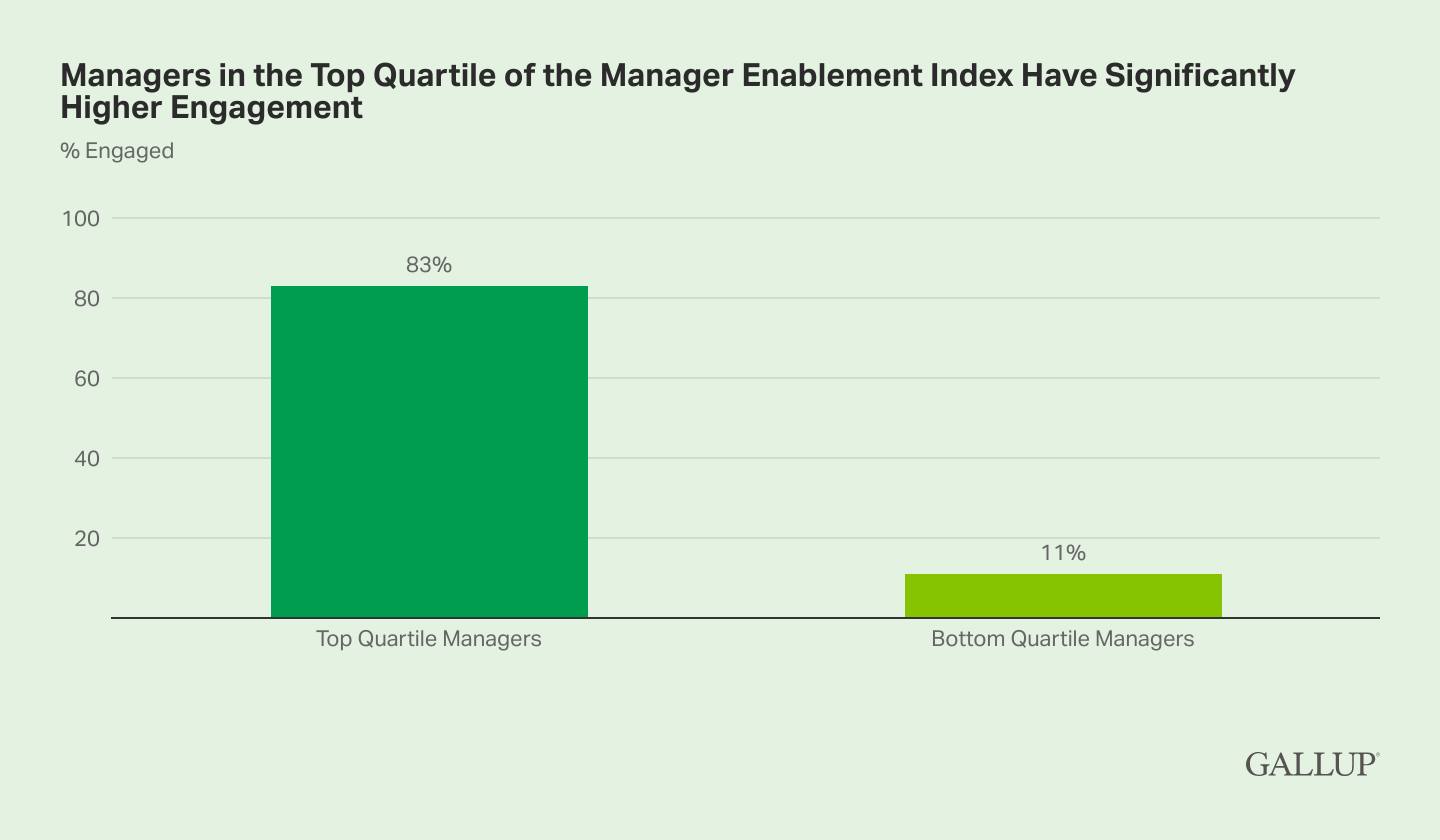Story Highlights
- 70% of the variance in team engagement is determined solely by the manager
- One large organization struggled to improve frontline manager engagement
- Custom solutions turned employee engagement data into meaningful day-to-day change
Gallup's most profound finding -- ever -- is probably this: 70% of the variance in team engagement is determined solely by the manager. Frontline managers, in particular, are the most crucial lever when it comes to engaging an organization's employees.
When managers are burned out and disengaged, companywide performance suffers. But when manager engagement is high, business success soars.
Gallup's most profound finding -- ever -- is probably this: 70% of the variance in team engagement is determined solely by the manager.
That's why the world's most engaged organizations make a point of supporting manager engagement. For these organizations, manager engagement isn't an annual consideration or a superfluous perk. Instead, they achieve lasting engagement growth because leaders ask the right questions and prioritize consistent conversations about engagement.
Conversations about engagement are most productive when leaders have reliable engagement data. All employees -- including managers -- have 12 basic workplace needs. The Gallup Q12 measures these needs and is the foundation for frequent conversations that spark change.
The Science Behind the Q12 Employee Engagement Survey Questions
Gallup's Q12 engagement survey isn't meant for employees to participate and move on. The Q12 works because it shows leaders and managers how to better support engagement -- and gives them a framework for conversations about engagement. There are the 12 basic human needs represented in the questions on Gallup's Q12 survey:
- I know what is expected of me at work.
- I have the materials and equipment I need to do my work right.
- At work, I have the opportunity to do what I do best every day.
- In the last seven days, I have received recognition or praise for doing good work.
- My supervisor, or someone at work, seems to care about me as a person.
- There is someone at work who encourages my development.
- At work, my opinions seem to count.
- The mission or purpose of my company makes me feel my job is important.
- My associates or fellow employees are committed to doing quality work.
- I have a best friend at work.
- In the last six months, someone at work has talked to me about my progress.
- This last year, I have had opportunities at work to learn and grow.
Recently, a large organization sought Gallup's aid to remedy its frontline manager engagement. In this organization, almost every level of leadership was highly engaged at work except the organization's frontline managers. These managers suffered from comparatively low levels of engagement, despite a work culture that emphasizes collective ownership for engagement goals.
Part of the problem was that senior leaders in the organization were struggling to turn manager engagement data into meaningful change. And Gallup's comprehensive analysis revealed that other employee experience factors contributed to the organization's challenges with manager engagement:
- a command-and-control leadership structure
- competing priorities for frontline managers
- a lack of focus on engagement at the frontline related to challenges tying engagement to daily work
- heavy manager workload due to excessive expectations outside managerial tasks
To address these concerns, Gallup created a custom index for this organization -- the Manager Enablement Index -- to help leaders engage frontline managers. The index is based on decades of Gallup research that includes multiple years of client data and Gallup's Boss to Coach data. It comprises five benchmarked questions that Gallup uses to measure frontline managers' needs and challenges related to:
- job authority and trust from senior leaders
- effective collaboration
- how managers are consulted about changes that directly affect them
- growth opportunities and development
- performance management
While Gallup's Q12 already provides a strong foundation for unpacking these topics with work teams, the Manager Enablement Index was specially calibrated to drill down even deeper into the support managers uniquely need when leading their teams. For instance, Gallup data show that in the U.S., managers are more likely than individual contributors to struggle with competing priorities and unclear expectations -- which fan the flames of burnout. Because the index focuses on managers' needs, it empowers leaders to target managers' engagement.
After including the Manager Enablement Index in a companywide engagement survey, Gallup and the client found that 83% of frontline managers who were in the top quartile of the Manager Enablement Index were engaged. In contrast, only 11% of managers in the bottom quartile of the Manager Enablement Index were engaged. Put simply, the Manager Enablement Index is strongly correlated with manager engagement -- making it an actionable and powerful tool for engaging managers.
Perhaps more powerfully, manager scores on the index predict individual contributors' engagement, too. When employees report to a manager who ranks in the top quartile of the Manager Enablement Index, 50% are engaged. But only 36% of employees are engaged if their manager scored low on the index.

The client and Gallup used discoveries from the index to craft a roadmap to improve manager engagement. For frontline managers, the insights have sparked supportive conversations with other managers about the five themes outlined in Gallup's Boss to Coach research -- such as how to become an effective coach who drives business results.
Now, client leaders are successfully using the Manager Enablement Index to decrease turnover in high-risk areas of the organization. In fact, Gallup's analysis showed that 54% of employees strongly agreed they planned to be working at the organization two years from now when they reported to a manager in the top quartile of the Manager Enablement Index, compared with only 39% of employees who said the same and reported to a manager in the bottom quartile of the index.
The Manager Enablement Index has made it simple for the client to turn engagement data into day-to-day behavioral change. The index is not only a measurement tool, but also a playbook that shows exactly where managers are doing well and where they need support.
The Manager Enablement Index has made it simple for the client to turn engagement data into day-to-day behavioral change.
And because manager engagement is connected to outcomes like turnover and team engagement, client leaders can anticipate that their tailored plan for manager engagement will also drive bottom-line results, particularly retention and burnout.
Across the globe, many managers are worn, stressed and tired. Engaging them takes skill and determination from committed leaders, but it's an investment that benefits everything an organization does and says. Engage your frontline managers, and you engage employees, customers and society. And with rising manager burnout, urgent action is critical.
Here are five steps any leader can take to start supporting their managers better:
- Focus on all the elements of the manager experience, from attraction to onboarding to performance development.
- Empower your managers to become coaches, not bosses.
- Select your managers based on their aptitude for management.
- Provide ongoing manager development with learning programs that are multimode, continual and experiential.
- Require all leaders -- including yourself -- to develop coaching skills. Use those skills to give managers meaningful, frequent, strengths-based feedback.
Engage your employees with a science-backed approach:
- Learn about Gallup's Q12 employee engagement survey.
- Give your managers exactly what they need to retain and engage their teams.
- Partner with us for unique solutions.





